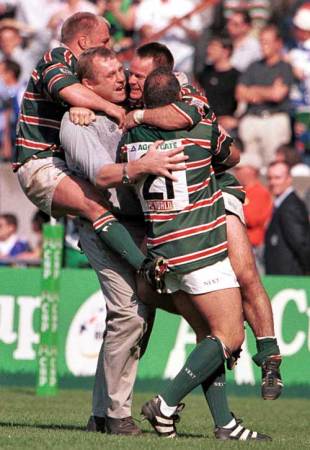|
English Rugby
Richards cast into the rugby wilderness
Graham Jenkins
September 2, 2009

Richards is engulfed by his players after guiding Leicester to the 2001 Heineken Cup crown
© Getty Images
Enlarge
From hero to zero. Dean Richards' once formidable reputation has been 'burnt to a cinder' by the Bloodgate scandal. It was the former Harlequins director of rugby's own solicitor who used that very phrase as he pleaded his client's case in the face of a three-year ban from the game - but what he failed to acknowledge was that it was Richards who sparked the fire with a dangerous game of deceit. As a result his career lies in tatters. As a player he won 48 England caps, played in six Lions Tests and graced three Rugby World Cups. As a coach he steered Leicester to four Premiership titles and two Heineken Cup triumphs and nurtured Harlequins' latest generation of stars. Regarded by many as the best coach in Europe and without peer in the UK, he was also linked with the England job just last year. But no longer will he be best remembered as one the greatest forwards of his generation. The fond recollections of a haggard-looking but crowd-pleasing Richards, shirt untucked and socks around his ankles, are now also a thing of the past. Similarly his outstanding coaching achievements will pale into insignificance. Instead, from now on he will be known as the mastermind behind the fake-blood controversy that dragged the sport's name into the gutter. How he must rue misplacing his moral compass on that fateful day last April when he tried to cheat Leinster out of the Heineken Cup by instructing winger Tom Williams to use some joke shop blood. Thankfully Leinster had the last laugh by lifting Europe's biggest prize. In a savage indictment of his role in the controversy, the European Rugby Cup appeals committee judgement declared that he was "prepared to try and cheat Leinster out of a victory" and was "quite disinterested in the consideration that by acting the way he did, the club which deserved to win the match might be deprived of its victory". His conduct that day was unforgivable but the subsequent attempts to cover up the crime are worthy of equal disdain. An immediate admission of guilt would not have cleared his name but it would have saved the sport from a mauling at the hands of the wider media. "It was open to him at any stage to have said that 'enough is enough' and that the reputation of rugby and Harlequins had been sufficiently damaged," declared the ERC appeal judgement. Richards ignored his conscience for nearly four months and so rightfully bears the brunt of that verdict. He may well cry foul at the severity of the three-year sanction and point to the lack of a precedent. His belated decision to plead guilty also failed to earn him any kind of a reprieve. But he is no scapegoat - he was bang to rights. What could have possessed one of the most successful players and coaches in English rugby history to jeopardise everything he had worked so hard for with such a blatant disregard for the rules? As we would later find out, it was because this was not the first occasion that Richards had cheated. Having successfully employed the tactic before, he obviously felt comfortable opting for it again despite the full media glare of the high-profile Heineken Cup stage. Richards could be seen as a victim of his own success. His outstanding rugby CV will have gone a long way to granting him the kind of all-encompassing power he reportedly wielded at Harlequins. As a result no-one questioned his authority when perhaps senior players should have stepped forward. Richards now faces three years in the wilderness but the stigma surrounding him will linger much longer. Sympathy has flowed from his many friends in the game including England manager Martin Johnson - his former captain at Leicester. Richards dutifully stood by his skipper through many a disciplinary storm during their time at the Tigers but found himself very much on his own in the wake of his own transgression. A lot of other doors are likely to close on Richards in the near future with some doubting whether he will ever return to the game. Denied a living in the union sphere he may well take his coaching prowess to another sport. The pressures of the professional game were cited by some as the reason behind Richards' willingness to take such a risk. And it is those same pressures that will likely lead to Richards' reintegration. His coaching ability is not in doubt - it is his disregard for the values at the heart of the game that have cost him dear. As a result it would not be surprising to see a host of clubs queuing up for his services come 2012 - for many will view Richards as unlucky to be paying for the sport's sins. In the meantime, he has three long years to reflect on his costly actions whilst stranded in the rugby wilderness. For a man who claimed to be devoted to the sport this is the ultimate sanction - but if he was so passionate about the game he would not have betrayed it. © Scrum.com
|
Live Sports
Communication error please reload the page.
-
Football
-
Cricket
-
Rugby
-
- Days
- Hrs
- Mins
- Secs
F1 - Abu Dhabi GP
Abu Dhabi Grand Prix December 11-131. Max Verstappen ()
2. Valtteri Bottas (Mercedes)
3. Lewis Hamilton (Mercedes)
4. Alexander Albon ()
5. Lando Norris ()
6. Carlos Sainz Jr ()
-
ESPNOtherLive >>
Golf - Houston Open
Snooker - China Open
Tennis - Miami Open

